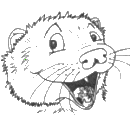Animal Welfare Bill
by Eric Shadforth
The original legislation on Animal Welfare was enacted in 1911 with various amendments added throughout the intervening time.
In the foreword to the draft bill, Margaret Beckett, the Secretary of State for the Environment, Food and Rural Affairs, states "One of the frequent complaints made against the existing animal welfare legislation is that effective action cannot be taken where a non-farmed animal, although not currently suffering, is being kept in such a way that suffering will probably occur at some future point. This is clearly unacceptable and I believe that a duty of care to promote the welfare of all animals kept by man is long overdue".
A consultation process commenced in January 2002 to determine what people would like see in twenty first century welfare legislation. Numerous national societies were approached to seek their views, the NFWS being but one of them. As secretary to the NFWS I attended a meeting at DEFRA Headquarters in London to discuss Pet Fairs and implications of the draft legislation.
For those of you who would like to study the full draft bill, it can be accessed from the DEFRA website, www.defra.gov.uk
For the purpose of this article we will look at Pet Fairs and the implications to the NFWS.
The recognised definition of a Pet Fair is: a temporary event (which may or may not be open to the public) organised for the purposes of exhibiting or exchanging or selling animals. The NFWS shows fall into the exhibiting category.
It is proposed that there will be three tiers of events, the first two being exempt from licensing, the third requiring licence.
Tier One
This is categorised as a Private meeting where:
- it is a private members club, i.e. NFWS members show only
- attendance of members and members guests only
- no public access
- meetings held on both private and public premises
- principal activities to include showing and lectures
- no trading activities for commercial gain
- no commercial animal vendors.
It is possible under this section for sale or exchange of animals to occur but must be:
a. between members only
b. on a not for profit basis
Tier Two- Exhibition Shows
Again, the event is organised by a private members club but may cover a wider geographical area.
As with tier one attendance of members and guests but, in addition a "small" percentage of the paying public
The principle activity is competitive showing
Commercial animal traders are again prohibited
Unlike tier one, this section allows for post exhibition sales to occur provided no more than 10% in total of animals exhibited are for sale. e.g. 100 animals exhibited allows for only 10 animals for sale.
Tiers one and two will not require a licence although we are awaiting confirmation from DEFRA on this.
Tier Three
This tier is divided into two sub-sections namely:
a. Hobbyists Open Show
b. Commercial Animal Fairs (including auctions)
Both these sub-sections allow for commercial animal trading to take place and will therefore require a licence.
All of the tiers places on the organisers a Duty of Care towards the animals welfare and could be subject to an inspection by the local authorities, whether licensed or not.
The implication on the NFWS shows are that ferret welfare is paramount. All ferrets must have access to food, water, latrine and rest areas. The animals must not be placed under duress through excessive handling, heat or cold. Transport to and from the show must be conducive to good sound practice, i.e. the ferret must be able to have free movement within a carry box, access to water etc. During the show, the cages should be cleared of droppings on a regular basis and water levels checked regularly.
To avoid the requirement of a licence and additional costs, ALL NFWS organised shows will prohibit any sales of animals. There will be no exceptions to this. Exchanges of ferrets may occur provided the organisers are informed in writing no less than 24 hours before the commencement of the show.
One of the key factors in the draft legislation is the creation of a "Code of Practice" which will follow the enactment of the bill into an Act of Parliament. In advance of this the committee has decided to prepare a document which is to be put to the membership as soon as possible. This will determine the conduct of the society in all areas including shows, rescues, welfare, hunting & co-operating with other societies/ organisations.
The opportunity to advance ferret welfare is in our hands and by working with DEFRA and other organisations, the National Ferret Welfare Society is raising the profile of these wonderful creatures.
Monday 4th October 2004.
